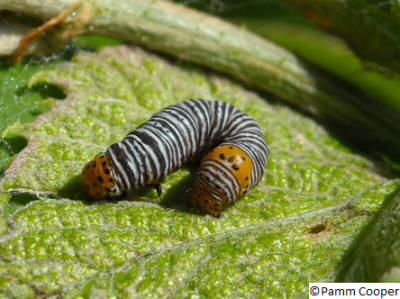Psychomorpha epimenis
The Grapevine Epimenis is an owlet moth that is found in woodlands, woodland edges and heathrows. The epimenis larva is bluish-white, and each segment of the body is marked by four transverse black stripes. There is a black-spotted red band on the eighth segment. The head, cervical and anal plates are red with black spots. The larva is about 3/4 inch long when fully grown. This caterpillar lives in a nest-like structure formed by fastening several leaves together with silken threads where it feeds.

The adult of the grapevine epimenis is a velvety-black moth. Across the outer portion of each front wing there is an irregularly shaped white patch. This moth is about an inch long and on each hind wing there is a large, smooth-shaped orange-red or brownish-red patch.
Life Cycle
Epimenis moths emerge in the spring after overwintering as pupae. The female moth lays eggs on or near the new foliage. Larvae emerge and construct an enclosure of terminal leaves by drawing the leaves toward each other and tying them together with silk. A single larva may construct several enclosures. The caterpillar feeds within the shelter.
Damage
Adults consume nectar from the flowers of a few early-blooming trees like cherries and plums and sumac. Like butterflies, they perform a behavior called “puddling” to get liquid nutrients that include minerals, salts, and amino acids from the edges of mud puddles. By early to mid-June the larva completes its development. The mature larva burrows into soft wood or any other suitable medium and pupates. Females lay their eggs as the new grape foliage emerges, and by the beginning of summer the caterpillar has completed its growth and pupated in soft wood or other dense plant material to overwinter in its cocoon.
These caterpillars are generally no cause for concern, and have little to no adverse effects on the overall health of the grape plant.
Despite good cultural practices, pests and diseases at times may appear. Chemical control should be used only after all other methods have failed.
For pesticide information or other questions please call toll free: 877-486-6271.
Revised by the UConn Home & Garden Education Center, 2016.